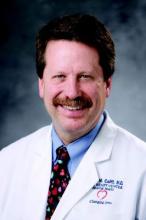In his new role as deputy commissioner for medical products and tobacco for the Food and Drug Administration, cardiologist Dr. Robert Califf plans to tackle a number of emerging public health and biomedical science issues, including 21st-Century Cures, Big Data, and precision medicine.
“What is especially interesting right now is that there a number of key issues that the FDA needs do deal with,” Dr. Califf said during a press teleconference. “There are so many critical issues where there’s not a single right answer, but there’s a balance that needs to be struck. It’s a great opportunity to help shape these concepts in a broad way.”
The FDA on Jan. 26 announced that Dr. Califf would take on the role of FDA deputy commissioner for medical products, a position that has been vacant since 2013. Dr. Califf is currently vice chancellor of clinical and translational research and professor of medicine in the division of cardiology at Duke University, Durham, N.C. He plans to take a 2-year leave of absence from Duke when he begins his new position in late February.
In his new role, Dr. Califf, a master of the American College of Cardiology, will provide executive leadership to the FDA’s Center for Drug Evaluation and Research, the Center for Biologics Evaluation and Research, the Center for Devices and Radiological Health, and the Center for Tobacco Products, according to a Jan. 26 announcement by FDA Commissioner Margaret A. Hamburg. Dr. Califf will begin his new role in late February.
“I am delighted to announce this important addition to FDA’s senior leadership team,” Dr. Hamburg said in the statement. “Dr. Califf’s deep knowledge and experience in the areas of medicine and clinical research will enable the agency to capitalize on, and improve upon, the significant advances we’ve made in medical product development and regulation over the last few years.”
As part of his new position, Dr. Califf will also oversee the FDA’s Office of Special Medical Programs and play a critical role in providing high-level advice and policy direction on the agency’s medical product and tobacco priorities, according to the announcement. Additionally, he will manage cross-cutting clinical, scientific, and regulatory initiatives for the agency, including personalized medicine, orphan drugs, pediatric science, and the advisory committee system.
Dr. Califf said he is excited to take on the position during the rapidly changing landscape of health care delivery and scientific advancements. For example, he noted the progress being made in medical data collection and utilization of that information.
“We’re just entering this amazing era of Big Data,” he said during the press conference. “You have multiple dimensions of data on a scale that we’ve never seen before and the question of how to sort out true signal from noise is just a great challenge.”


